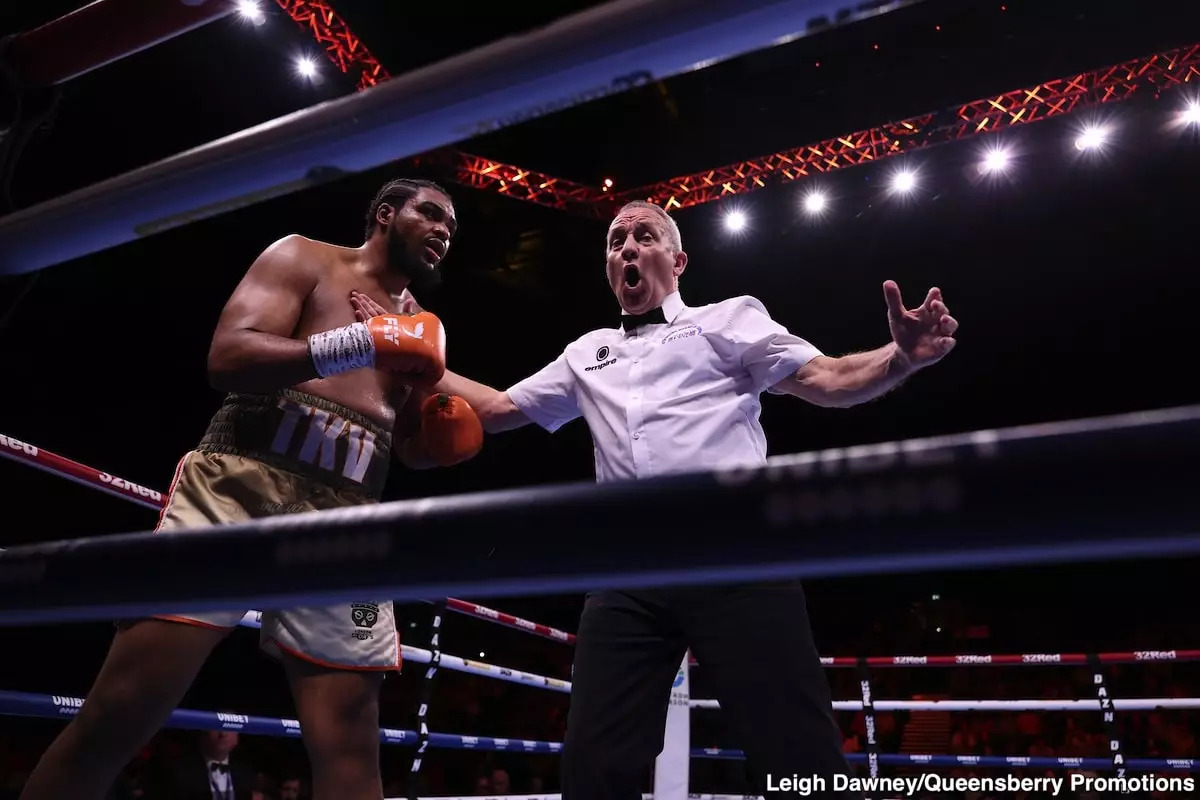Boxing, a sport rife with tension, intrigue, and occasionally, sheer disbelief, reenacted one of its most jaw-dropping episodes last night in Manchester. The spotlight was not only on the main event, featuring Filip Hrgovic’s victory over Joe Joyce, but also on a controversial British heavyweight title elimination fight between David Adeleye and Jeamie TKV. The bout, shrouded in uncertainty, showcased the pandemonium that ensued when an apparent foul overshadowed the match’s outcome. Casual fans and hardcore aficionados alike were left speechless as the implications of the referee’s decisions reverberated throughout the boxing community.
In the decisive round six of the showdown, a moment that could be described as critical to both fighters’ careers unfolded. As the two competitors were separated by referee Ron Kearney, Adeleye seized the opportunity to deliver a left hook that connected directly with TKV’s chin, sending him crashing to the canvas. What followed was a cascade of confusion and outrage that would overshadow Adeleye’s victory. The pervasive feeling among viewers was that this was more than just a delicately poised fight gone awry; it was a clash of integrity and rules.
Inattention to Rules: A Near-Disaster
Shortly before the strike landed, Kearney had called for a break—not once, but twice. He even signaled to TKV, tapping him on the glove, instructing him to disengage from the clinch. By the time Adeleye unleashed his punch, it had escalated from a simple boxing match into an egregious violation of the unwritten rules of fairness that the sport strives to uphold. The fallout from this incident was palpable, igniting a firestorm of criticism not just toward Adeleye but squarely aimed at the officiating.
Promoter Ben Shalom did not mince words in his condemnation. “What I’ve just witnessed was one of the most disgraceful things in my career,” he declared, summing up the frustration running rampant in the boxing world. Shalom’s insistence that the outcome be overturned stems not only from his allegiance to TKV but also from a broader perspective of maintaining fairness in the sport. The integrity of the game should never be traded for a fleeting moment of glory, yet this incident begs the question: how can such misjudgments still occur in professional boxing? The outrage is justified, considering TKV had control of the match, rendering this a tragic misstep.
The Stakes of the Appeal
As the spectacle unraveled, many wondered what steps the British Boxing Board of Control would take. Would they rectify this apparent miscarriage? Appeals in boxing often yield minimal results, leading to a long history of questionable decisions being swept under the rug. The situation poses a significant dilemma: a simple reversal of the outcome could serve as a symbol of justice, yet it’s not so easily enacted in a sport haunted by disputes.
It also raises the fear that TKV’s career trajectory could be unfairly hampered by this incident. Ali Eren Demirezen, another heavyweight contender, understands the conundrum; he once endured a similar fate, leaving fans asking if boxing culture would adapt to prevent such viscerality. TKV has expressed his belief that he was unfairly treated, and echoing Shalom’s sentiments, he deserves a chance to reclaim lost momentum and relevance in an unpredictable sport.
Looking Ahead: A Reunion or a Rethink?
But the overarching question remains: do audiences want a rematch between these two heavyweights following such a polarized episode? While the initial bout failed to deliver thrills until its chaotic climax, TKV’s poignant position as the seemingly wronged fighter would warrant a second chance. After all, does the audience not owe it to the sport to see a fair contest unfettered by the standards of dubious officiating?
Given the dramatic twist of fate that marred the match, many boxing enthusiasts will grapple with the reality of waiting for an official rematch. The controversy has put a spotlight on accountability within boxing; it may also foster discussions about necessary reforms to protect fighters and their rights. It is high time that boxing champions not only their titans in the ring but also the very principles that maintain a healthy competitive environment.

